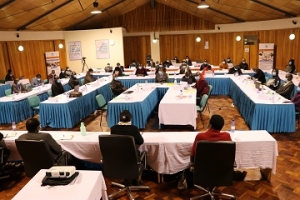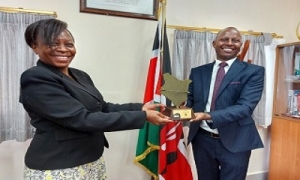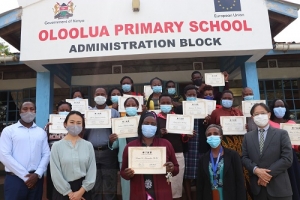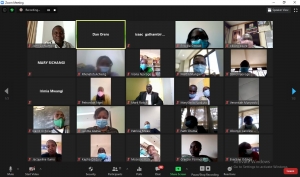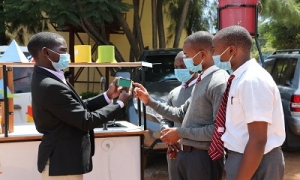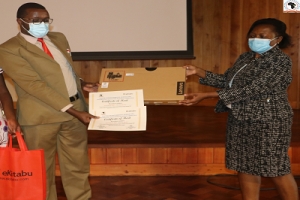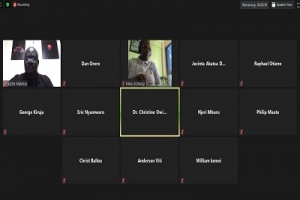Esther Nyambura
Director CEMASTEA, Madam Jacinta L. Akatsa, HSC, giving key note address during the opening ceremony of a one week training workshop by CEMASTEA to 30 teachers of mathematics and science from Sunshine secondary school. The training theme was ‘Enhancing effective learner involvement through learner centered pedagogies”. She emphasized the need to breakdown concepts in a form that is easier for comprehension by learners. She shared very insightful lived experiences of innovative strategies that promote effective learning. She advised participants to embrace forums that allow sharing of lived experiences in teaching and learning as a great strategy that impact on curriculum delivery.
Mrs. Jacinta L. Akatsa, HSC, Director CEMASTEA during the opening ceremony of a one week training workshop to Sunshine Secondary School Math/Science teachers
Centre for Mathematics, Science and Technology Education in Africa (CEMASTEA)
TEACHING AND LEARNING DURING COVID-19 PANDEMIC: INSIGHTS FROM SELECTED MATHEMATICS AND SCIENCE TEACHERS IN KENYA
COVID-19 pandemic has had devastating effects on all spheres of life and the education sector has not been spared. The disease was first reported in China in December 2019. By January 2020, it had become clear that COVID-19 was raising health concerns including the fact that it was highly contagious with a potential to cause death for some of the infected persons. Thus, the World Health Organisation (WHO) asked countries to take precautionary measures to ensure containment of the disease. The first case of COVID-19 was reported in Kenya on 13th March 2020 and two days later the President directed all learning institutions to close as a containment measure to curb the spread of the disease. Even though the closure of schools did not mean the end of education, it temporarily halted the face-to-face interactions between teachers and students.
To ensure continuity of learning following the schools closure, the Ministry of education (MOE) drafted the Kenya basic Education COVID-19 Emergency Response Plan (MOE, 2020), to guide the process. For example, through the plan, the MOE committed to strengthen the Kenya Education Cloud at the Kenya Institute of Curriculum Development (KICD) to ensure easy access to digital content by teachers and students. The MOE also tasked KICD to ensure provision of Radio and TV broadcasts on a timely and predictable manner including broadcasting through community radio channels. However, it was not clear how teachers would navigate the process of supporting learning through remote means as well as the kind of support they needed to be effective and successful in their work. This concern arose from the fact that up until the emergence of COVID-19 pandemic most of the teaching had been face-to-face.
This study which involved 472 SMASE Secondary school county trainers and 3718 secondary school mathematics and science teachers trained through CEMASTEA in 2020 was conducted to give insights into this issue. The study sought to (1) identify ways in which COVID-19 affected teaching and learning in secondary mathematics and science in Kenya (2) determine mathematics and science teachers’ perspectives about online teaching and learning (3) determine the ICT tools and platforms, sources of information, and support that enabled mathematics and science teachers to continue supporting learners during the COVID-19 pandemic (4) identify areas of capacity development for mathematics and science teachers to continue teaching during COVID-19 pandemic. To address these objectives the study adopted a descriptive survey methodology and utilised questionnaires to collects data.
The findings of this study show that teaching and learning was affected in three main ways as follows (1) disruption to teaching and learning (2) shift from face-to-face to remote teaching and learning, and (3) disruption to activities related to teaching and learning. As far as disruption to teaching and learning was concerned, the respondents noted that face-to-face interactions with student were not possible as a result of COVID-19 pandemic. They were concerned about students missing such interactions with the concern being greater for the Form Four students because of being in a candidate class and therefore expected to sit KCSE later in the year. It also emerged that despite this concern for students missing such interactions, majority of the respondents took more than four weeks to reach out to support students’ learning.
Indeed only about 40% of the respondents took the steps to reach out to students and support their learning utilising mainly telephone and specifically WhatsApp. The low percentage of respondents who made an attempt to reach out to students could be attributed to their perception about remote teaching and learning where majority of them did not believe that there could be effective teaching and learning through online platforms. This study also revealed that a teacher’s confidence to enact teaching through online platforms is a factor that affects whether or not a teacher engages students to learn through online platforms. The Multiple Logistic Regression Model applied in this study showed that respondents who were somehow confident or not confident at all to conduct teaching through online platforms had a relatively high likelihood of not conducting lessons during the pandemic period compared to those who were confident.
It also emerged that COVID-19 disrupted the routine of activities related to teaching and learning in terms of time spent on these activities. On average, between 43% and 45% of respondents spent less than two hours on teaching and other activities related to teaching such as planning lessons; reviewing lesson notes; assessing students’ learning and revising work already covered with students.
Regarding ICT tools, it emerged that the respondents were aware of a variety of ICT tools that could be deployed to support students’ learning during COVID-19 pandemic. The tools include hardware such laptops, mobile phones, CD-ROMs, Television, radio as well as platforms such as Google Classroom, WhatsApp, Facebook and sources of e-content form the internet through search engines such as Google, Firefox and Microsoft Edge. Despite, this high extent of awareness, the respondents’ deployment of these tools in supporting learning during COVID-19 was low for all the tools except WhatsApp which had the highest reported incidents of use. Internet connectivity (both in terms of cost and coverage) was the single factor cited most by respondents as a hindrance to the deployment of the tools to support students’ learning during COVID-19 pandemic.
All in all, the respondents acknowledged receiving support from several stakeholders aimed at continuity of learning during COVID-19 pandemic. The stakeholders who played a key role in this process included the MOE, Ministry of Health, TSC, KICD, CEMASTEA, school administration and County Governments. The support provided ranged from provision of information about COVID-19 (i.e., the need to keep and stay safe), and payment of salaries to capacity development in the use of some of the learning management systems (LMS), and provision of e-learning materials and internet bundles to access the materials.
This study concludes that, only a limited number of mathematics and science teachers reached out to their students to support their learning during COVID-19 pandemic. This was mainly due to barrier of accessibility and cost of ICT tools on the part of students. But also, the teachers’ perception about remote learning and their confidence to enact teaching through online platforms played a role in this. The study recommends that there should be sustained teacher professional development especially in the area of remote or online teaching and learning to equip the teachers with the requisite skills to support learners during circumstances that lead to prolonged school closures. Furthermore, ICT tools that include devices such as such as Smart phones, tablets, laptops, radio, TV and internet sets as well as electricity are enablers of remote or online learning. These resources need to be made available to all teachers and students to enable implementation of remote or online learning. This can only happen through a concerted effort of all stakeholders (i.e.,, BOM, school administration, and parents) including multi-agency support through various ministries such as MOE, ICT and energy. Specifically parents on their part are required to provide ICT tools and related resources such as internet bundles to ensure continuity of learning in circumstances leading to prolonged school closures. But more importantly, the role of parents in home schooling needs to be explored given the need for them to play a role also in guiding and supporting their children to gain meaningfully from the experiences of remote or online learning.
Artcile by John Odhiambo Chair, DMC, CEMASTEA
During the 2020 National Diversity and Inclusion Awards & Recognition (DIAR) held at Sarit Expo Center, Nairobi, on Friday, March 12th 2021, CEMASTEA was awarded a trophy for the best Government Institution People living with disability (PWD) inclusion. The trophy was delivered to CEMASTEA by James Maina, Executive Director, Daima Trust, Kenya. Daima Trust, Kenya, runs DIAR awards. The short award presentation ceremony was attended by Director CEMASTEA, Mrs Jacinta Akatsa, HSC. John Odhiambo DMC Chair, Joseph Ngugi DMC Vice-Chair and Thuo Karanja P.C. Chair. Mr Maina having had the opportunity to tour the Centre and witness activities of the DMC's expressed that CEMASTEA well deserved the award. He advised the Committee to have more PWDs work at CEMASTEA and training programmes to be more inclusive. He expressed the willingness to partner withCEMASTEA on such programmes.
Mrs, Jacinta Akatsa Director CEMASTEA, receiving the 2020 Award from the Executive Director, Daima Trust, Mr James Maina
Currently, CEMASTEA has within its staff three who are PWDs.
The Disability Mainstreaming Committee at CEMASTEA is the most active in implementing yearly performance contracting targets set by the Kenya Government. The Committee aims to improve service delivery to CEMASTEA clients continually and, in particular, those with Persons Living with Disabilities (PWDs). Since its inception, the Committee, with the support of Centre management, has implemented programmes that have greatly improved the physical infrastructure at the Centre and made it friendly for the mobility and comfort for PWDs.
Left: Main Ramp through the Administration Block to the classrooms and laboratories Right: Staff practicing Kenya Sign Language (KSL) as an ongoing best practice to ensure a friendly environment for the hearing impaired
Sample of initiatives focusing on infrastructure to accommodate persons living with disabilities (PWDs include building ramps and rails, disability-friendly washrooms, and modification of hostels rooms. The Committee has also facilitated the training of more than 20 staff on basic Kenya Sign Language (KSL). The Committee works closely with the National Council for Persons with Disabilities (NCPWD), an established Government of Kenya Department whose mandate is to facilitate disability mainstreaming Programmes in the public and private sectors. NCPWD has elevated CEMASTEA as a Centre of excellence concerning the Mainstreaming of PWDs programmes and recommends other government institutions to visit and benchmark the Committee's success.
Collaborative Lesson Research (CLR) is a model which addresses teaching and learning gaps through collaborative planning, implementing and organized post lesson discussions.
The CLR study venture is among Japan International Cooperation Agency (JICA), Centre for Mathematics, Science and Technology Education in Africa (CEMASTEA) and five Primary Schools namely Visa Oshwal, Karen C, Oloolua, Buruburu 1 and Kyamulendu. The collaboration started in the year 2019 and is expected to take three years.
With the onset of COVID-19, the engagement was halted with a hope of a little break and resumption. In November 2020, an online training was conducted from 23rd to 27th November. Organizers for the training were Japanese experts from Tokyo Gakugei University (TGU) with the Lead Researcher on CLR and key trainer, Dr. Akihiko Takahashi operating from the USA.
Participants were a team of CEMASTEA staff and teachers drawn from the five schools. The training involved synchronous and asynchronous sessions.
(JICA long term expert Prof. Tetsuya Takahashi, CEMASTEA team and participants who undertook online training with their certificates; (clockwise) Karen C primary , BuruBuru 1 Primary , Kyamulendu Primary and Oloolua Primary Schools)
During the online training, participants were taken through the concept of lesson study commonly known as “Kyouzai Kenkyu” in Japan. They used mathematical examples to elaborate how teachers can collaboratively plan lessons and maximize on learners’ ideas during teaching for effective curriculum delivery.
Those who successfully completed the training were awarded certificates. It is hoped that the idea shall be passed on to other teachers in our schools.In January, 2021, JICA dispatched a long term expert Prof. Tetsuya Takahashi to CEMASTEA to support the research process.
(JICA long term expert, Professor Takahashi Tetsuya)
Article by Dan Orero and Mary Sichangi, CEMASTEA
The virtual training course whose theme is, “Towards developing a quality gender-responsive STEM education through learner-centred teaching and learning practices” is being implemented under collaborative partnership between the Centre for Mathematics, Science and Technology Education in Africa (CEMASTEA) and the Education Development Trust (EDT). The aim is to develop teacher capacity in quality gender-responsive STEM education towards learner-centred teaching and learning practices. The training is targeting primary school teachers from Nairobi County.
Section of the participants during the opening ceremony
Since the emergence of COVID-19 health pandemic, in a bid to continue with the training CEMASTEA transformed its training modules to virtual platforms namely; Google classrooms, Zoom webinars and Padlet Media blackboard.
The chief guest during the opening ceremony was the Regional Director of Education, Nairobi County, Mr. Jared Obiero who recognized CEMASTEA’s efforts in hosting this important course. He pointed out that gender disparities still exist in performance in STEM education.
He informed the participants that the course will equip them with innovative teaching methodologies to enhance attainment and realization of improved performance in STEM subjects. He encouraged them to embrace and apply gender responsive pedagogy call measures in the respective schools.
The Director CEMASTEA, Mrs. Jacinta Akatsa thanked EDT for partnering with CEMASTEA to mount the course and for complimenting the Ministry of Education efforts to achieve its mandate. She mentioned that the course is designed to give the participants an interactive virtual experience.
Mrs. Jacinta L. Akatsa, HSC Director CEMASTEA
She further stated that CEMASTEA has transited its training materials to online and the course can be conducted virtually using various platforms. She said that the course will give the participants an opportunity to interact virtually as they discuss gender responsive pedagogy in STEM. Mrs. Akatsa encouraged them to use the knowledge and experience gained to help the learners achieve excellent results in STEM subjects.
While speaking to the participants the Deputy Director EDT, Sub Saharan Africa, Mr. Mark Rotich thanked the Ministry of Education, TSC and CEMASTEA for working together to implement such an important course. He mentioned that EDT believes in transformative ability of education and that is the reason for partnering with CEMASTEA.
Mr. Mark Rotich, the Deputy Director EDT, Sub Saharan Africa speaking during the opening ceremony
He emphasized that quality teaching is directly linked to learners’ outcome. He promised that EDT will continue partnering with CEMASTEA, Ministry of Education and TSC to ensure quality training and professional development towards improved learning outcomes.
Corporate Social Responsibility (CSR) gives an opportunity to contribute in giving back to the society. Aligning with CEMASTEA’s mandate to provide continuous professional development of teachers in STEM education, The Centre’s CSR activities are a tool to help create awareness of its brand and programmes and put a smile on the faces of learners and teachers in schools through donations towards improving Mathematics and Science.
Through the Director, Mrs Jacinta L. Akatsa, North Highridge Secondary School, Nairobi County and Kyangwasi Secondary School in Makueni County, were pleased to receive a mobile lab, mathematics models among other maths and science equipment in January, 2021.
While receiving the equipment, Mrs. Jane Bunyansi, Principal, North Highridge Secondary School, Nairobi County, promised that the equipment would be put to good use in improving maths and science performance in the school. Hon. Timothy Wanyonyi Wetangula, Westlands Constituency Member of Parliament (MP), who had visited the school, applauded CEMASTEA for the tremendous work of supporting the school. He was positive that the mobile lab would assist the students. The Director, CEMASTEA urged the students to take more interest in science subjects and have a positive attitude in learning. She was impressed with the students’ engagements in hands on activities and wished the candidates success in their forth coming exams.
Left: Hon. Timothy Wanyonyi Wetangula (seated) receiving the Mobile Lab and other equipment fromMrs Jacinta L. Akatsa, HSC, Director CEMASTEA at Highridge Secondary School, as Mrs. Jane Bunyansi, the Principal, teachers and students look on.
“ Nothing has been so difficult in the teaching profession than to define a mobile laboratory to form four students, but today, no more definitions since they have seen it. ”
Mr Mailo Peter, Physics teacher North Highridge Secondary School
At Kyangwasi Secondary School in Makueni County, the Principal, Mr. Ken Kamendi thanked CEMASTEA for the donations. He celebrated the good work the Centre was doing in promoting mathematics and science in Africa. All present were in agreement that the school would perform better in the subjects. The guests included the Sub- County Director of Education, Mr Kinuthia members of the school board and sub county administrative officers. The Director CEMASTEA, Mrs Jacinta L. Akatsa, ably represented by Mr Mutua Muyanga, called on the teachers to work tirelessly in lifting the standards of the students and be more innovative in their teaching.
Mr. Mutua Muyanga, (second from right) presenting a list of laboratory equipment to the Principal and the guests present.
Right: The school principal, guests and teachers of the school
Left: Mr Paul Akoko, CEMASTEA Biology Lab technician, explains how the Lab works to a teacher in the school.
Right: Students receiving the Lab
“The best way to explain a sink is to bring someone to a sink. There is no other way. ”
Mr Ken Kamendi, Principal, Kyangwasi Secondary School
CEMASTEA WISHES ALL CANDIDATES success in their forth coming exams
Director CEMASTEA Jacinta Akatsa HSC presents a laptop, a trophy and certificates to Mr Jeremiah M. Njeri, a teacher at Wajir High School who emerged the North Eastern regional winner (teachers’ category) in the Remote Learning Competition.
The Centre for Mathematics, Science and Technology Education in Africa (CEMASTEA) has launched free online webinar series on "Educational Innovation in STEM: Towards Enhancing Continual Learning during Crisis Times". The well-paced five day hands / minds-on training is staggered to twice a week on Tuesday and Thursday East Africa Time. The course attracted over 450 participants who include; ministry of education officials, university lecturers, directors in charge of mathematics and science education, teacher trainers, school principals, teachers, quality assurance officers, and NGOs all drawn from 19 countries. For effective learning interactions, they have been grouped into cohorts of 100 each. The one-month online webinar series will discuss pedagogical entrepreneurship cycle that supports blended learning. The following are snap shots of the second session of cohort two held on 6th August, 2020.
The chief guest, Mr. Abdi, the Director General, Ministry of Education, Kenya presided over the opening ceremony of the ongoing online webinar training and informed the participants that the educationists are devising innovative ways of delivering curriculum without face to face interaction between the learners and the teachers. “It is important to provide continuity of learning despite all the challenges brought about by the COVID-19 pandemic” He said that it is good to keep the learners busy not only through academic learning but also through life skills. He mentioned that home schooling which was only limited to a few has since changed overtime thereby giving us a glimpse on how education could change for the better in the long run. He lauded the Centre for Mathematics, Science and Technology Education in Africa (CEMASTEA) for being in the forefront of utilizing technology and reaching out to teachers and education stakeholders wherever they are giving an opportunity to perfect on technology and building on the future systems of education. He thanked the Director CEMASTEA, the team and partners for coming up with the noble idea of virtual sessions not only for STEM subjects, but also useful in other subjects in the curriculum.
The opening keynote was delivered by Mrs. Jacinta Akatsa the Director, Centre for Mathematics, Science and Technology Education in Africa (CEMASTEA). In her speech she delved on supporting learning continuity through education innovation in STEM through experiences and innovations. The speech focused participants on the strengths, weaknesses and opportunities during a crisis. She encouraged the participants to develop innovative solutions and actions to address the need and mitigate the effects of the long school closure.
The team of facilitators taking the participants through sessions:
Participants were divided into discussion group activities in order to apply learnt principles. They also came up with some initiatives that they shared with the members in the group.
Participants in group activities
Article by Mrs. Mary Sichangi, Coordinator Partnerships and Linkages and Dan Orero, Corporate Communications Officer II - CEMASTEA
CEMASTEA has been conducting professional development of science and mathematics teachers to change their attitudes as well as those of their students. The professional development is also conducted to shift the teaching from teacher-centered to learner-centered pedagogies. While there is commendable success in this direction, there is little empirical evidence of how the professional development initiatives affect the pedagogies that the teachers employ in their classrooms.
This impact analysis study used trained research assistants drawn from a pool of Quality Assurance and Standards Officers (QASOs) with a Science and Mathematics background to follow 40 carefully sampled teachers who had undertaken training through CEMASTEA involving Inquiry-based learning (IBL) and 5E instructional Model strategies. The teachers together with 811 of their students were selected from eight counties.
The following are findings of this research
Changes in the student’s attitudes in science and mathematics. The students hold a positive attitude towards science and Mathematics that measured 3.82 on a scale of 1-5. This attitude is not uniform for all subjects and seems to have greatly changed in favour of Physics.
Leaner-centeredness of lessons. The students reported that for every two weeks 71% of their lessons were leaner-centred. For example, in chemistry, 6.5 out of 8 lessons offered in two weeks had hands-on activities for students.
High pedagogical knowledge but lower content knowledge: 45% of the content in the lesson observed had tasks designed at the low “confirmatory” level of inquiry and another 42.5% at “structured” level of inquiry. Teachers rarely made changes in the material as presented in the course books. This may be due to low content mastery, it was noted that when in class, 53.1% of the teachers operated at higher levels of inquiry (i.e., “guided and “open” inquiry) often characterised by open-ended questions that extended learners engagement. This means that the development of pedagogical knowledge is good but there were gaps in the development of content knowledge.
Besides, the study showed that the teachers’ practice was affected by the following issues
- Inadequate infrastructure including laboratory space and equipment, and ICT infrastructure
- Low morale especially due to lack of support by the school administration as well as strenuous workloads
- Syllabus coverage with emphasis is on the pace of coverage at the expense of quality teaching. Principals did not support teaching for conceptual learning and understanding.
- Entry characteristics of learners are deteriorating, and in many ways becoming more diverse. There are also more students with special needs. It is increasingly becoming necessary to differentiate instructions on this basis.
Recommendations
- Leverage on ICT to extend professional development beyond the INSET workshop, to reach more teachers at a time, improve communities of practice among the teachers, host and share exemplar practices on an accessible cloud platform.
- Increase frequency and length of contact with teachers to adequately inculcate a modern teaching philosophy as well as increase uptake of new pedagogies.
- Efforts should focus teachers on improving Content mastery by focusing teachers on designing alternative activities.
- There is an increasing need to integrate strategies for learners with Special needs
- More research: How does fast-tracking content coverage affects learning outcomes? What is the extent of diversity in the current classes? What is the impact of the current efforts in integrating ICT?
The study recommends that to curb the dynamic variations in the students’ attitudes in mathematics and science, CEMASTEA should consider ways they can encourage interdisciplinary collaborations. The rigidity to textbooks that limits the teacher’s ability to design suitable tasks can be mitigated through encouraging creative and exciting explorations such as those in the CEMASTEAs training manuals. The students also recommend that CEMASTEA tries to train teachers as close as possible to the opening day for schools to allow them to practice what they have learned while it is still fresh in their minds.
The career fair commonly themed as ‘Careers for the Future’ is an annual event by myNETWORK with the purpose to motivate ambitious young people with the thirst for more information to improve their careers. This year’s event was held from January 17 – 18, 2020.
About 35 institutions of higher learning exhibited at the event showcasing different opportunities they have for learning as far as careers and opportunities are concerned.
Group photo from STEM participants comprising the mentors and the mentees
Various guests graced the event as speakers and to offer motivation and guidance to the young people, among them was Nation Media Group CEO Mr. Stephen Gitagama who officially opened the event, Mr. Caleb Karuga - the Founder and CEO of Wendy Farms, Roy Gitahi - CEO Art at work Limited, Ms. Celestine Olilo - Editor at MyNetwork Magazine and Sports, Journalist, Mr. Robert Mutahi - Creative Director Urban Designs Studios, Ms. Roselyne Kigen -Founder, International parenting for a better life, Ms. Jane Muiruri - Hr practitioner, Ms. Velma Amondi – the Distribution Manager at IBM, Ms. Njeri Mburu and Mr. David Nyakaru who are both national trainers at the Centre for Mathematics, Science and Technology Education in Africa (CEMASTEA).
Mr. Gitagama encouraged the young entrepreneurs to cease sitting back and feign unemployment, instead, they should learn to be self initiators and take the bull by its horns.
Nation Media Group CEO, Mr. Stephen Gitagama during his opening remarks
Themed discussions on matters focusing on Creative Arts and Sports, Entrepreneurship, Manufacturing and STEM (Science, Technology Engineering and Mathematics) were also carried out and participants sat in the tent whose theme best suited them and had a chance to interact with their mentors and ask questions where necessary.
The Centre for Mathematics Science and Technology Education in Africa (CEMASTEA) was greatly represented by Madam Njeri Mburu and Mr. David Nyakaru.
Madam Njeri Mburu, national trainer at CEMASTEA speaking to the participants of STEM during the mentorship programme
In the current era, technology is everything and an individual who is tech-savvy can drive the business to succeed. Madam Njeri emphasised on the need to be unique, creative and innovative of which CEMASTEA is passionate about with its mandate on offering Teacher Professional Development (TPD) to Science and Mathematics teachers.
She mentioned that the youths should be teachable and the knowledge gained to be used to create more job opportunities for themselves and for others. She reiterated that the behaviour of aping what others are doing should be replaced with being creative thinkers and by doing so the young people will be able to address problems in life head-on using technology.
In addition, Mr. Nyakaru stated that the world out there is full of opportunities waiting to be discovered and it can only be achieved through being real and doing everything practically.
He brought to their understanding the aspect of being both a consumer and a presumer which can only be met by the creation of forums to enhance matters concerning technology.
Mr. David Nyakaru, national trainer at CEMASTEA speaking to the participants of STEM during the mentorship programme

